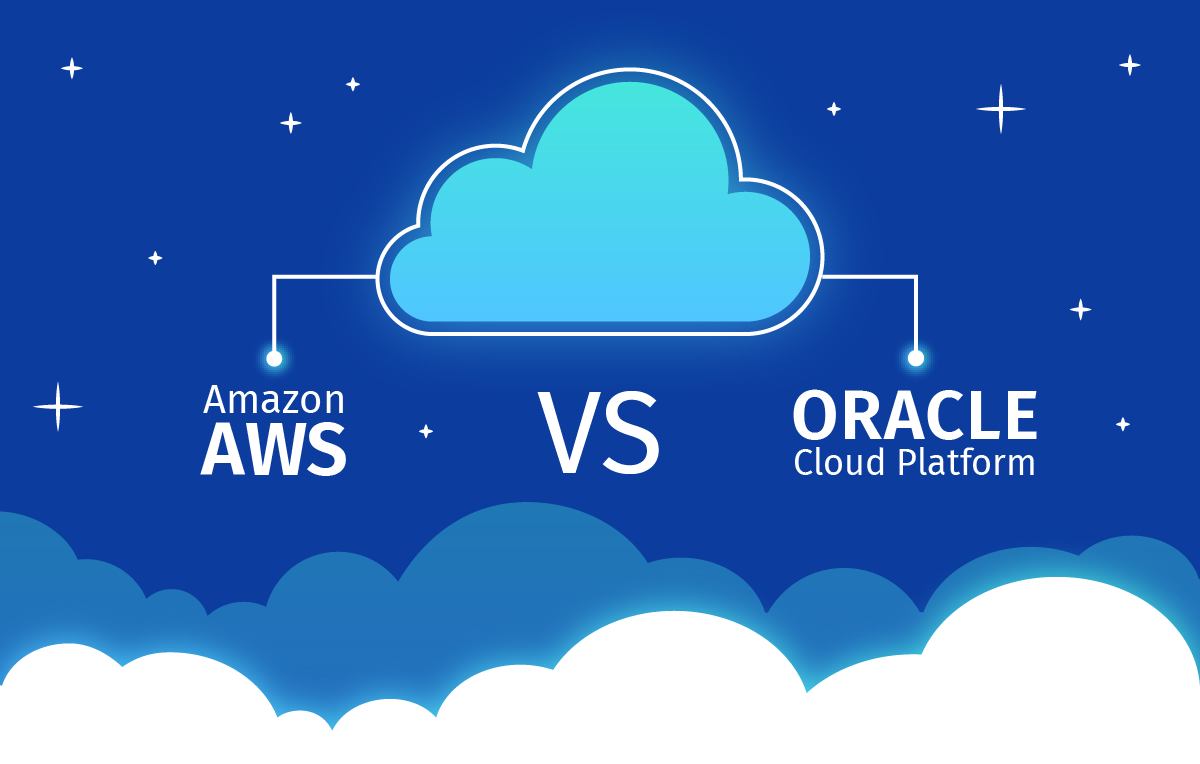Cloud technology seems to have captured the hearts of millions of developers and business users worldwide. This is not surprising, because cloud-based services enable faster development and provide better security if compared with on-premises solutions. If your business processes are not in the remote environment yet, it’s time to take a look at the list of cloud service providers and choose a suitable platform.
Drive your digital transformation to the next level with our world-class cloud development services
Cloud Services Market
In 2018, 3.6 billion internet users accessed cloud services, up from 2.4 billion users in 2013, according to Statista.
Number of consumer cloud-based service users worldwide in 2013 and 2018 (in billions)
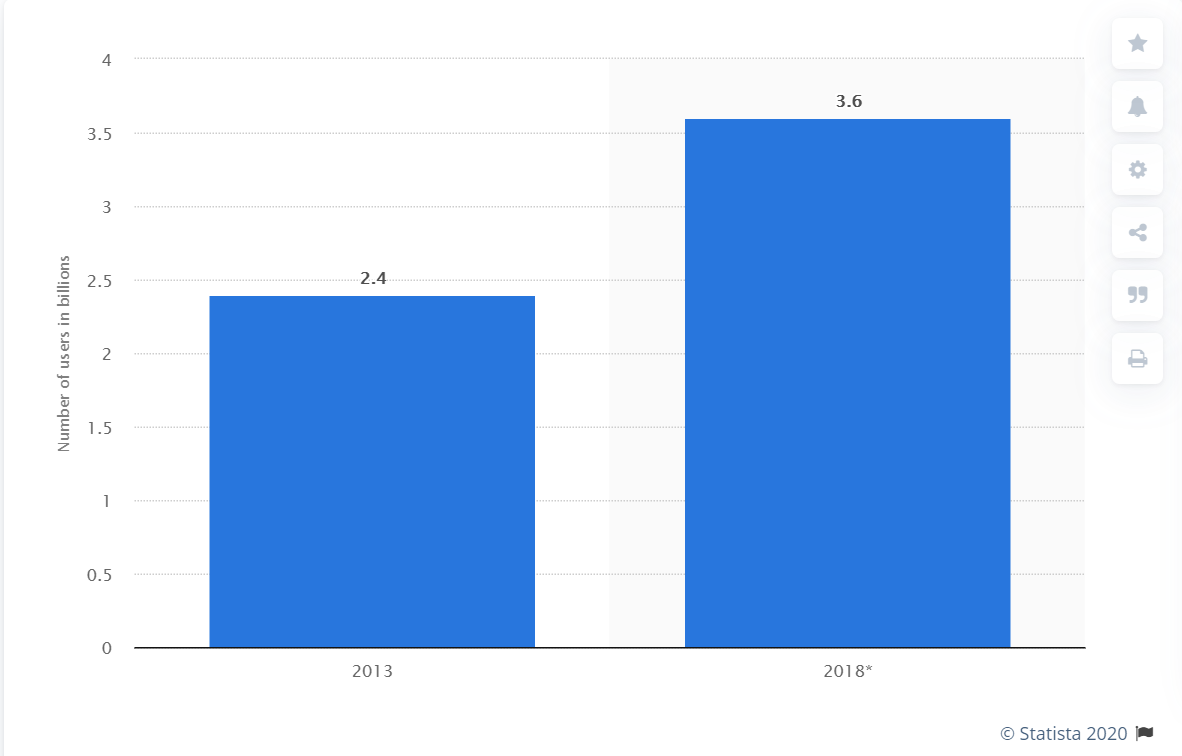
Source: Statista
The following statistical facts prove that cloud technologies are really powerful:
- Cloud hardware, software and services are capturing 60% of IT market growth, mostly in the public cloud space, at the average CAGR of 17%
- In 2020, the global cloud IT market revenue is predicted to reach $390 billion
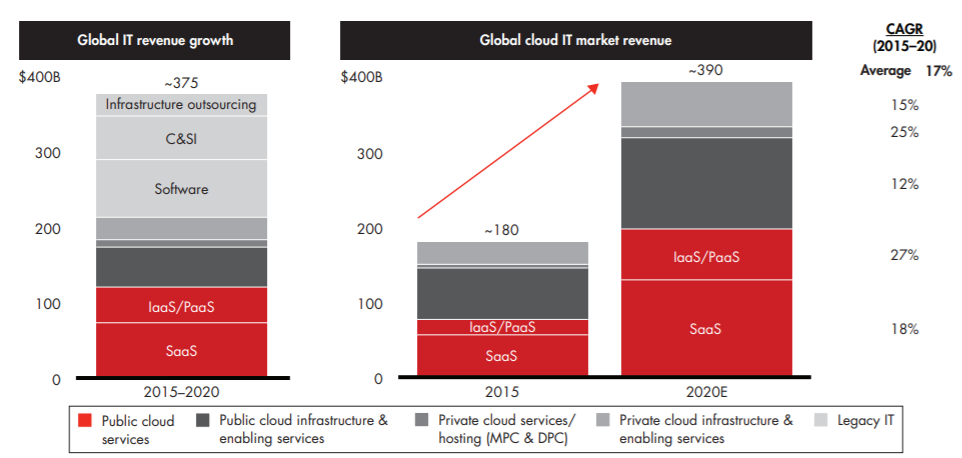
Source: Bain&Company
- Platform-as-a-Service (PaaS) is forecast to be the fastest-growing sector, from 32% adoption in 2017 to 56% in 2020, according to KPMG
- Top five industries that are going to spend the most on public cloud solutions by 2021 are discrete manufacturing, professional services, banking, process manufacturing and the retail industry, IDC reports.
Read also: Pros and Cons of PaaS: a Practical Overview
Top reasons driving companies to go serverless:
- Improved agility
- Accelerated product development
- Reduced expenses

Source: KPMG
As you see, migration to remote servers is a must for any company that wants to stay competitive in the modern market. It helps companies jump-start their projects and add value to their business operations, such as our SaM CloudBOX PaaS, a ready-to-use development framework, does. But it’s not an easy task to create the correct cloud business, as you should choose the right vendor out of a long cloud service providers list.
Core Criteria for Choosing Providers of Cloud Computing
Top cloud computing companies, as well as less popular providers, make up a huge market with tremendous opportunities. They offer a wide array of products and services, including data storage, app creation, website hosting, ready-made software solutions, etc.
Picking a provider is a crucial step because it directly influences the long-term success of an enterprise. A snap decision can turn out to be a costly mistake.
When evaluating vendors, customers should consider a number of points to make the right choice.
Business Needs
First off, define your requirements, and only then, start looking at vendors. A deep understanding of your particular business needs will help you quickly exclude unsuitable candidates from the list of cloud computing providers. It’s more effective to compare vendors against your specific requirements, but not against each other. This way, you will create a shortlist of potentially suitable cloud storage providers pretty quickly.
Cost
The budget you can allocate for migration should be the key determinant as well. Define the exact sum of money your company is ready to spend on remote infrastructure and, proceeding from there, compare the prices of service packages and licenses of your top cloud service providers.
Data Security
Corporate data is the most valuable asset that providers must protect. Check the compliance of candidates with recognized security and quality standards. Ensure that their data protection units are mature enough and are able to exclude data breaches. Consider the physical location of the servers, since this might come into play when it comes to sensitive information.
Technical Capabilities
Further, technical competencies and operational capabilities should be analyzed. Check whether providers are experienced in technologies you need and how many skilled specialists they have. Some cloud vendors work with subcontracting suppliers, which can be both an advantage and a disadvantage for customers, so this factor may help you shortlist candidates.
Company Profile
Apart from technical experience, the company profile can be a determining factor. Look at the history of potential vendors, their previous customers, their publicly available financials and any legal issues they may have had in recent memory. In other words, make sure that a provider has a sound foundation and will be a reliable partner for the long term.
Customer Support
Some companies offer comprehensive support, while others provide a limited version. You must be sure that you will get professional help (if needed) both during the migration process and afterward.
If a vendor suits you in all respects but it can’t provide the necessary level of support, you may find third-party partners that have enough experience of the target platform and will address unforeseen issues. In any case, you should understand what to expect from your future provider prior to signing an agreement.
Types of Cloud Computing Service Providers
Vendors are categorized depending on the services they provide or on the types of clouds they offer.
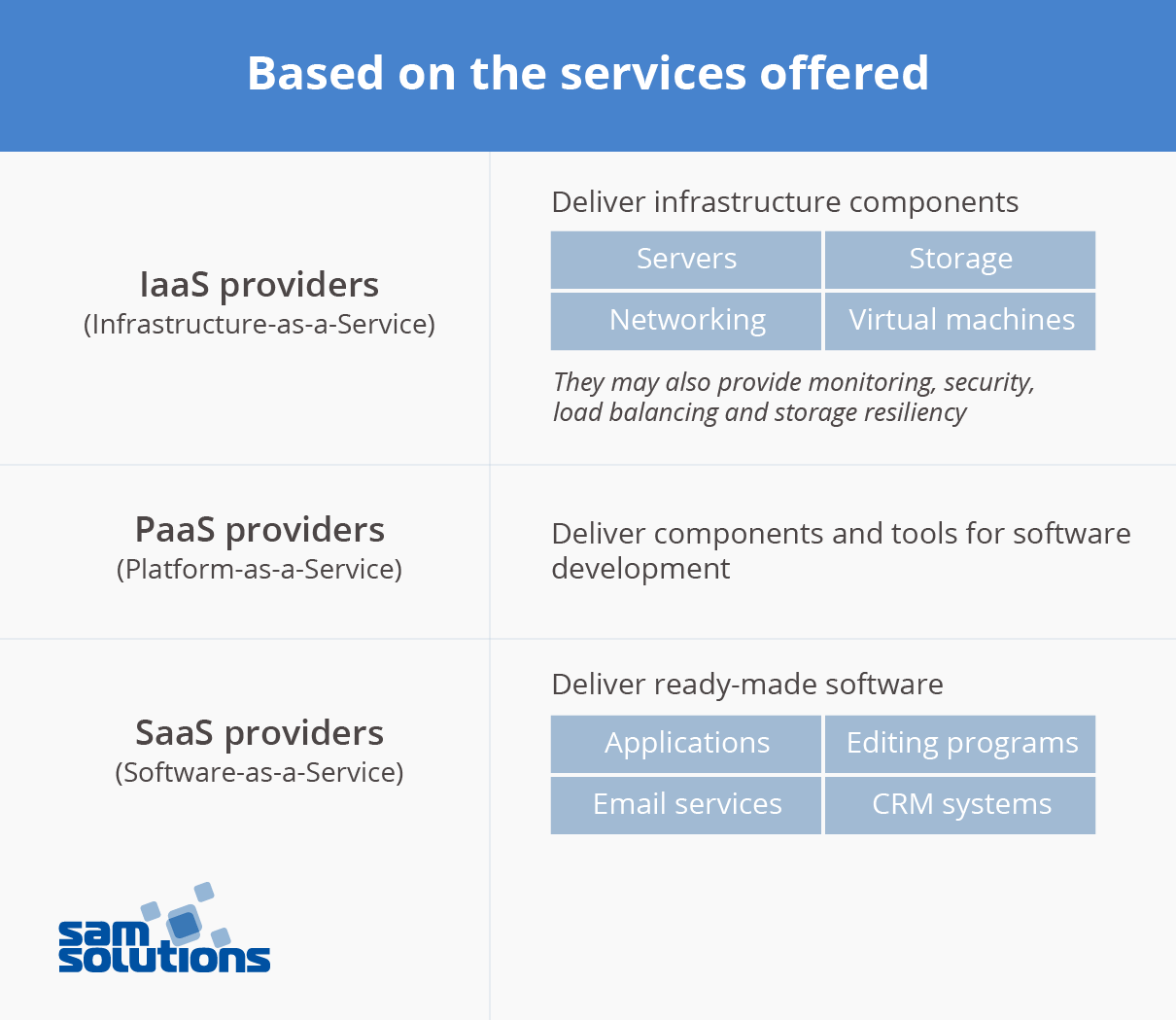
IaaS cloud providers offer components such as servers, storage, virtual machines, networking.
PaaS cloud providers deliver infrastructure components and tools for software development.
SaaS cloud providers offer ready-made software solutions such as applications, editing programs, email services, CRM systems.
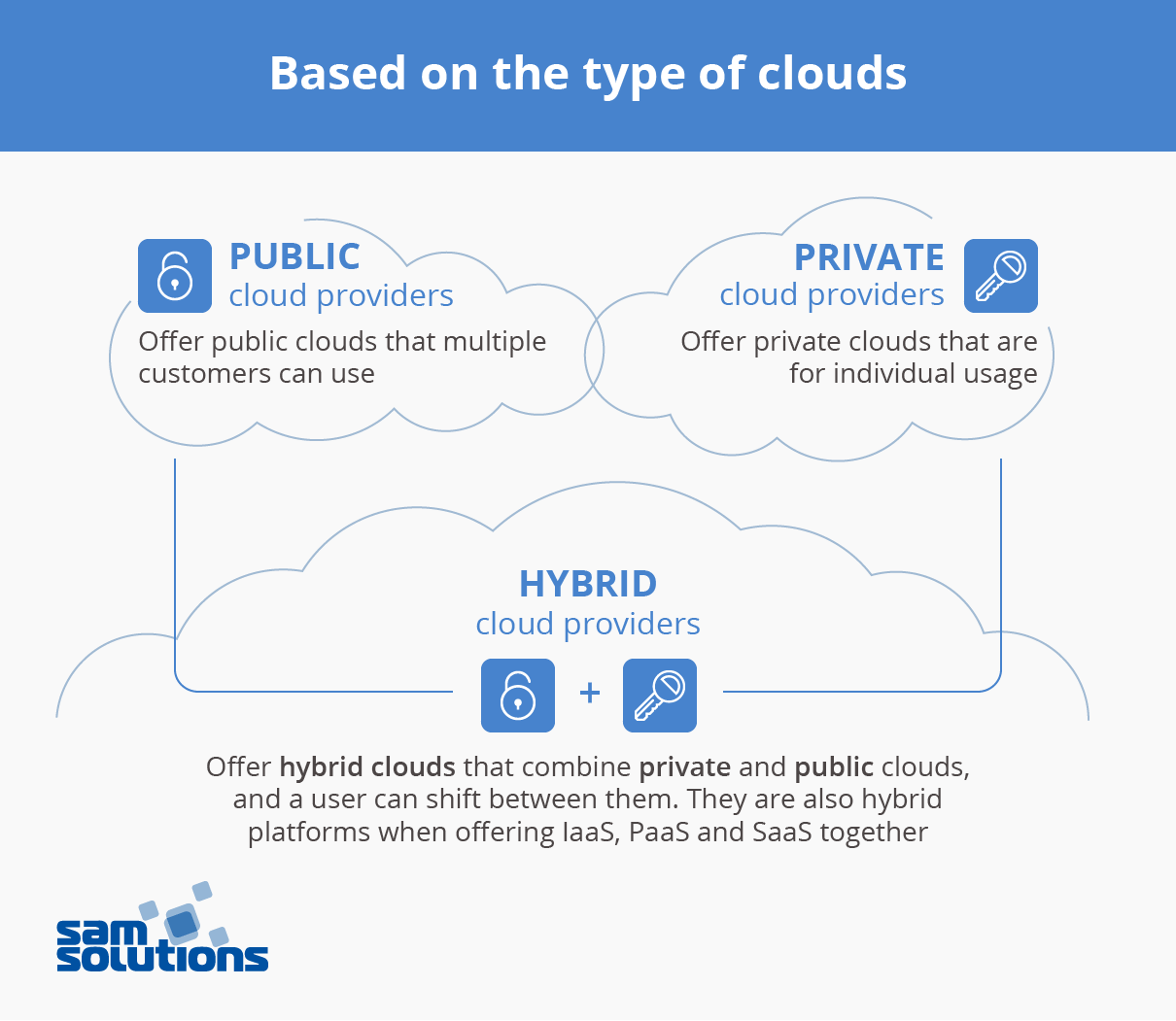
Depending on the type of clouds, we can distinguish public, private and hybrid cloud providers.
Nowadays, most of the leading vendors belong to the hybrid type as they offer a set of top cloud computing services.
Read also: 4 Cloud Deployment Models You Need to Know
List of the Best Cloud Service Providers
According to the 2019 research by Statista, Amazon, Microsoft and IBM are three top cloud computing service providers worldwide, with Amazon having a strong lead over the others.
Global market share of cloud infrastructure services from 2017 to 2019, by vendor
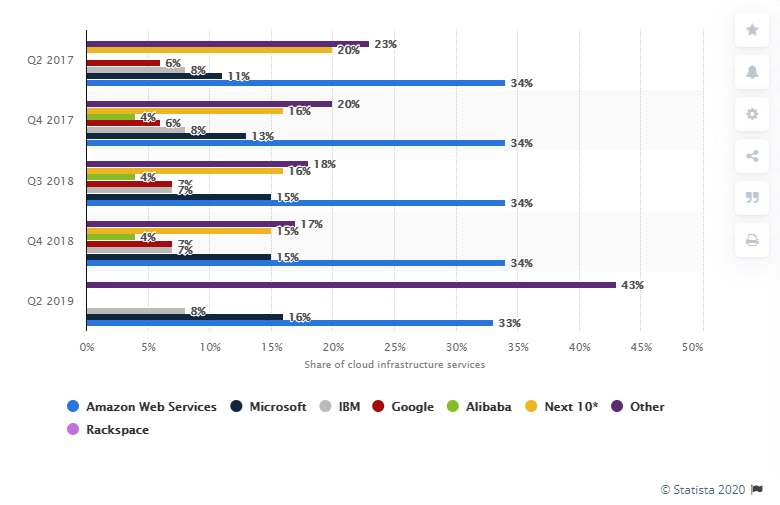
Source: Statista
Here is a cloud computing services provider list with a detailed description of companies.
Amazon Web Services (AWS)

AWS has grown into the most comprehensive provider in the cloud market with the widest range of products and services. An undisputed leader, Amazon has an offering for everyone, from freelance developers to the largest corporations.
The company introduces all the latest technological trends including machine learning (ML), the Internet of Things (IoT), artificial intelligence (AI), blockchain, and augmented and virtual reality (AR and VR).
AWS creates projects for large enterprises and startups in different industries (automotive, healthcare, manufacturing, retail, telecommunications, oil and gas), as well as for the public sector.
Learning opportunities are represented by precise documentation, numerous tutorials and training courses (some of them are free).
There is a great digital catalog — AWS Marketplace — where you can find thousands of units of software created for AWS.
Pros
- A variety of choices (the biggest provider in terms of products and custom options)
- Safety (Amazon ensures security, identity and compliance with standards)
- Pay-as-you-go pricing model
- Global availability
- A mature company with a supportive community
Cons
- Complexity (since the company is quite big and is constantly introducing new tools, there are dozens of opportunities that can become tangled)
Microsoft Azure

Microsoft rightly deserves the second position in the rating of the world’s top cloud providers. It has created its hybrid platform Azure, embracing three major categories, SaaS, PaaS and IaaS, to meet business challenges in various industries such as financial, retail, manufacturing, healthcare, gaming, government, etc.
The platform provides IoT, AI and blockchain solutions; allows developers to create mobile and e-Commerce apps; ensures data confidentiality; and analyzes Big Data.
When Microsoft moved Windows, Office, SQL Server, SharePoint and other solutions to Azure, it automatically turned to the number one vendor for thousands of organizations that are using these solutions. Moreover, Microsoft Azure Cloud has strong relations with other vendors (e.g. Adobe, SAP, Cisco), ensuring plenty of integration opportunities.
In the Azure marketplace, users can discover and deploy software for any purpose.
Pros
- High availability (54 global Azure regions)
- Security
- Scalability with the click of a button
- Partnership with other vendors
Cons
- Not cost-effective for small companies
- Reliability and performance issues
IBM Cloud

IBM is constantly competing with Google for the third position in the rating. Let’s trust Statista and consider IBM cloud services to take the bronze medal in 2017.
The IBM cloud (former Bluemix) is a full-stack platform that encompasses public, private and hybrid environments. It offers the widest array of products and resources for any workload.
The platform stands out in areas such as blockchain, cognitive computing and artificial intelligence. Other services include migration, managed hosting, analytics, DevOps, digital process automation, development of native mobile apps and chatbots.
IBM has some unique offerings that its competitors can’t boast, e.g. bare-metal servers that comply with particular security needs.
Pros
- A variety of tools
- Simplicity
- Flexibility and customization
- DevOps and continuous delivery
- Bare metal servers
Cons
- Limited regions of availability
- Limited third-party integration
- Changing prices
Google Cloud Platform
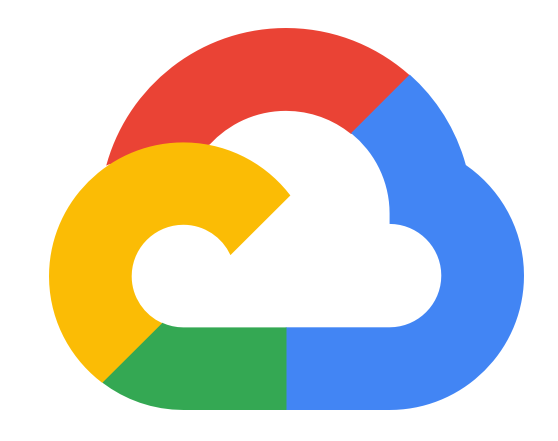
Google doesn’t lag far behind its competitors and allows customers to improve productivity by going serverless and using the company’s solid expertise in continuous integration and delivery. There are also numerous opportunities to learn and collaborate with experts, including in-person or virtual training courses, certification, strategy consulting, help in building roadmaps, etc.
Google can boast of a great portfolio of services:
- Compute
- Storage
- Migration
- Databases
- Networking
- Management and developer tools
- Media solutions
- Data analytics
- Machine learning
On top of that, Google cloud computing provides security enforcement as a priority, so customers don’t have to worry about their data safety.
Pros
- Experience as the leading search engine
- The speed of migration and delivery
- Reasonable prices
- Security
- Cooperation with developers to get insight into their needs
- Openness to innovations, particularly ML and Big Data
Cons
- Limited global availability
- Fewer offerings in comparison with AWS and Azure
Alibaba

The largest Chinese cloud company Alibaba can be considered the dark horse in the market. Though quite young, it has enormous potential and is developing at a rapid pace. Alibaba has already created a global footprint of 19 data centers and 50 availability zones.
Pros:
- Rapid growth
- Partnership with well-known IT companies such as Intel and Equinix
- Solid funding
Cons:
- Compliance issues
- Poor customer service
Adobe

Adobe Creative Cloud is, perhaps, the best vendor of apps and services in terms of creativity. It allows users to create the designs and process video and photography, either directly on the remote environment or by downloading Adobe products on preferred devices (in this case, users have to validate their license from time to time).
Oracle Cloud

A hybrid platform provided by Oracle consists of products that help accelerate business transformation.
Pros
- Smooth transition
- User-friendly environment
- Solid infrastructure to support large enterprises
- Big data management system
Cons
- Limited integration with other software
- Poor support and lack of tutorials
Dropbox

It is very convenient to have a safe repository to store any type of files and access them from anywhere. Dropbox is such a kind of repository. Using Dropbox, you can integrate different apps, share files with anyone, coordinate teamwork within a collaborative workplace and visualize your ideas.
We develop innovative cloud-based solutions for clients around the world
Going Cloud Becomes a Necessity
With more and more businesses moving their data to the remote environment, it’s important to remain competitive.
The SaM Solutions team of professional cloud developers can be of assistance in choosing the appropriate vendor and completing comprehensive projects. Our team has had a successful experience with platforms such as AWS, Azure, IBM, Oracle, Red Hat and Salesforce.
Go serverless and save money on hardware and support with SaM Solutions.



























 5 Reasons Why Your Business Needs a Mobile eCommerce Application
5 Reasons Why Your Business Needs a Mobile eCommerce Application Using Salesforce to Improve Your Sales Pipeline: Five Tips
Using Salesforce to Improve Your Sales Pipeline: Five Tips Cross-Platform Mobile Development: Five Best Frameworks
Cross-Platform Mobile Development: Five Best Frameworks How to Develop Custom Accounting Software
How to Develop Custom Accounting Software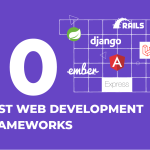 10 Best Web Development Frameworks in 2024
10 Best Web Development Frameworks in 2024











